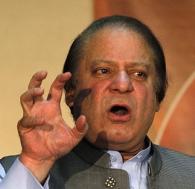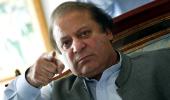 Unveiling Pakistan's foreign policy roadmap, Prime Minister Nawaz Sharif on Thursday vowed to "progressively pursue" normalcy in ties with India while actively seeking solutions to outstanding issues, including Kashmir.
Unveiling Pakistan's foreign policy roadmap, Prime Minister Nawaz Sharif on Thursday vowed to "progressively pursue" normalcy in ties with India while actively seeking solutions to outstanding issues, including Kashmir.
Listing his government's foreign policy priorities a day after assuming office, Sharif, in a message sent to the heads of all Pakistani missions, said neighbours will be the focus of "immediate attention".
"Unless the region is peaceful, our efforts for growth and development will not meet with success," he said.
"With India, the prime minister stressed the need to progressively pursue normalcy in our bilateral relations, while actively seeking solutions for all outstanding issues, including Jammu and Kashmir," said a statement issued by the Foreign Office.
Sharif, 63, who was sworn in for a record third term as premier on Wednesday, had signalled even before the May 11 general election that he intended to work on improving relations with India.
He has said that he worked hard for detente with India before former military ruler Pervez Musharraf deposed him in 1999.
"We will pick the threads where we left. We want to move toward better relations with India, to resolve the remaining issues through peaceful means, including that of Kashmir," Sharif told the media recently.
During the poll campaign, Sharif had vowed to revive the Indo-Pak peace process, which was interrupted in 1999 by Musharraf. He had started the peace process with then prime minister Atal Bihari Vajpayee.
In his message to the Pakistani envoys, Sharif stressed the importance of developing regional consensus on supporting a stable government and peace in Afghanistan.
"He affirmed that a policy of an Afghan-led, Afghan-owned process of peace and reconciliation will be pursued," the statement said.
On relations with the US, Sharif noted that the two countries have "many areas of common interest".
He said, "We will build on convergence and wherever there are divergences, we will work to try to minimise and remove such divergence."
Sharif said his government will develop a comprehensive strategy and national consensus on terrorism in consultation with political parties, security forces, media and civil society.
"At the same time, it is imperative to address the external dimension of terrorism. This would require plugging the sources of external funding of various extremists groups, besides seeking cooperation of the regional and global community," he said.
Sharif expressed a desire to deepen relations with "friends and brothers" in the Middle East.
Saudi Arabia, Turkey and Iran are friendly countries with which Pakistan will continue to pursue close cooperative relations, he said.
"With China, which has always been a great friend and a significant economic partner, Pakistan will strengthen this valuable and much appreciated strategic relationship," he said.
Analysts said the message issued by Sharif indicates the Pakistan Muslim League - Nawaz’s desire to play a strong role in shaping all aspects of foreign policy, which has traditionally been controlled by the powerful military establishment.
In an interview before the polls, Sharif made it clear that the elected prime minister would be the army chief’s "boss".
Sharif said in his message that "the people of Pakistan have pronounced themselves clearly on the future direction that our country should take" and they had been "abundantly clear in underscoring their priorities".
The government will be guided by the wisdom of the people, the vision of the country's founder Muhammad Ali Jinnah and the "desire to see Pakistan acquire its rightful place in the comity of nations", he said.
"Pakistan's size and innate strengths should enable it to have a key role on the global scene," Sharif said.
The heads of diplomatic missions are Pakistan's "first line of defence and our primary interface with the outside world" and they have important roles to play to achieve this objective, he added.
Sharif said, "National interests shall drive our foreign policy in all circumstances and there is across the board consensus on this."
He stressed the need to create an external environment in which a democratic and progressive Pakistan will be engaged with the outside world and this will be shaped by Jinnah’s vision of "peace within and peace without".
The core of internal strength lies in sustained economic growth and the diplomatic missions have a pivotal role in advancing this central objective of the national agenda.
Sharif directed the missions to aggressively pursue economic diplomacy.
Sharif expressed his government’s firm commitment to address the energy crisis facing Pakistan in the shortest possible time.
He encouraged the heads of missions to identify potential bilateral and multilateral partners to help address the crisis and to frame project proposals in traditional and renewable energy sectors.











 © 2025
© 2025